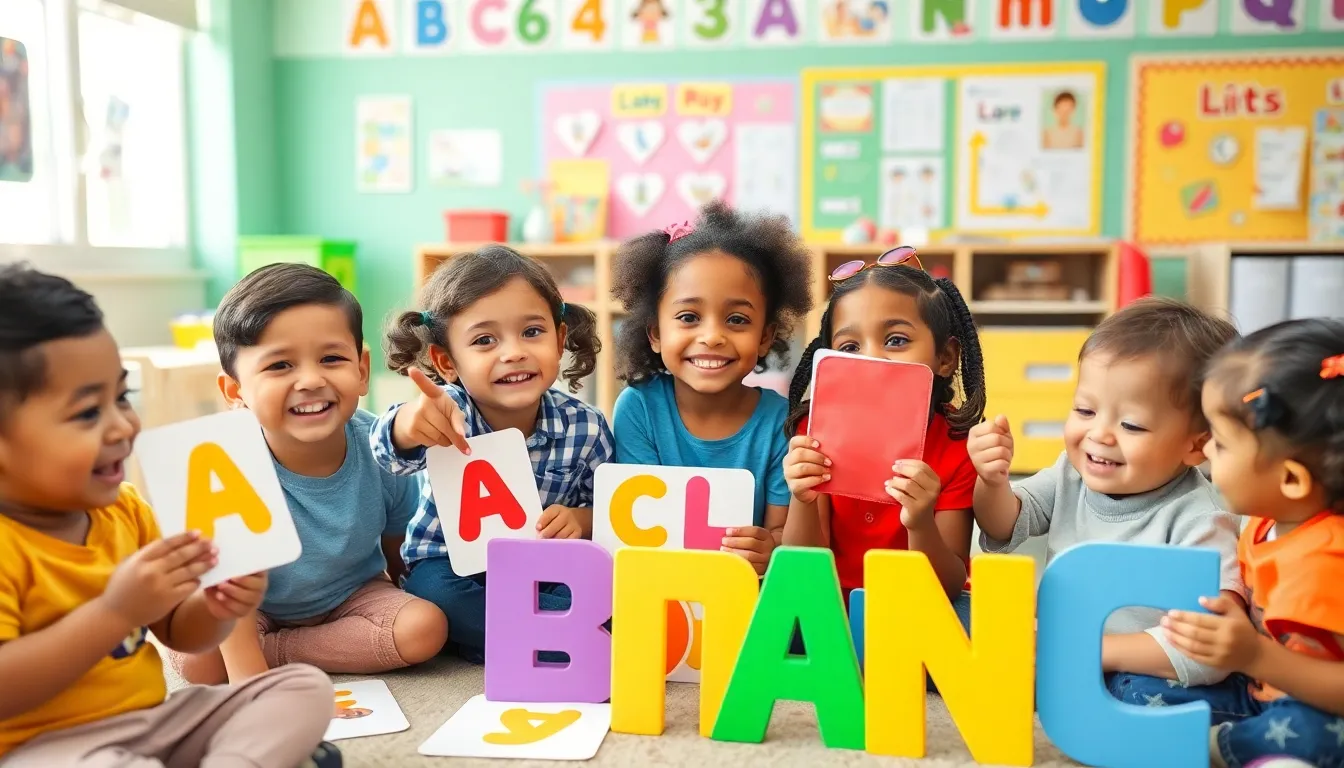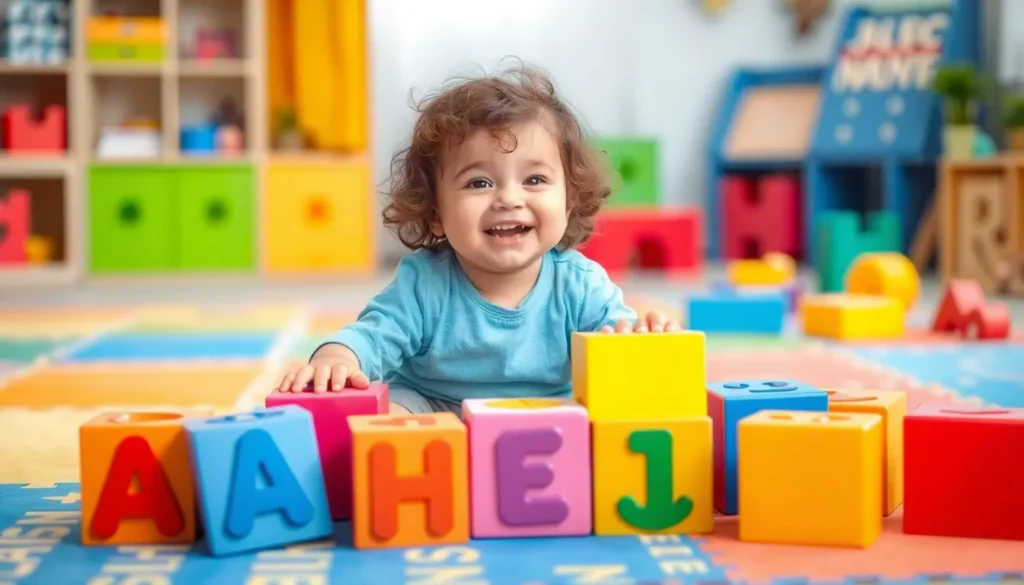In a world full of letters, mastering the alphabet is like unlocking a secret code to endless adventures. Whether it’s for toddlers who think “A” stands for “awesome” or adults rediscovering their love for language, learning the alphabet opens doors to creativity and communication. Imagine the thrill of stringing together letters to create words that dance off the page!
Table of Contents
ToggleImportance Of Learning Alphabet
Learning the alphabet plays a crucial role in early education and personal growth. Mastering these foundational skills paves the way for effective communication and creative expression.
Cognitive Development
Cognitive development significantly benefits from learning the alphabet. Young children engage in critical thinking as they recognize letters and their sounds. This early exposure boosts memory skills and enhances brain connectivity. Games involving letter identification stimulate problem-solving abilities while making learning fun. Adults also experience cognitive benefits by revisiting these skills, sharpening mental processes and boosting overall literacy.
Language Foundation
A solid language foundation relies heavily on understanding the alphabet. Letters serve as the building blocks of words, and recognizing them enables individuals to read and write. Familiarity with the alphabet fosters vocabulary growth and comprehension skills. Children who know their letters can identify new words and make connections between sounds and letters. This knowledge continues to support advanced language skills in adults, enriching their capacity for communication across various contexts.
Effective Methods For Learning Alphabet

Learning the alphabet can be more enjoyable and effective through various teaching methods.
Visual Aids
Visual aids play a key role in understanding the alphabet. Colorful flashcards grab attention and help children connect letters with images. Using alphabet charts in classrooms or homes reinforces recognition through repetition. Books featuring large, bold letters alongside pictures engage young learners and make the experience interactive. Furthermore, incorporating letter games on screens can captivate both children and adults, enhancing memory retention. Visual stimulation fosters excitement around learning and supports cognitive development.
Interactive Games
Interactive games enhance the learning process significantly. Play-based activities allow children to explore letters in a fun environment. Board games and card games encourage letter identification while promoting social interaction. Online platforms offer various alphabet games, making practice accessible and convenient. Involving adults in these games not only provides a teaching opportunity but also fosters a sense of connection. Engaging in letter scavenger hunts promotes movement and excitement, creating positive associations with learning.
Tips For Parents And Educators
Parents and educators can play an essential role in helping children master the alphabet. By implementing specific strategies, they can make learning both effective and enjoyable.
Encouraging Practice
Encouraging regular practice solidifies children’s understanding of the alphabet. Short, daily sessions produce the most significant results. Using flashcards serves as an interactive way to reinforce letter recognition. Asking children to identify letters in their environment helps make learning relevant. He or she can repeat after hearing you say each letter. Incorporating songs and rhymes adds an element of rhythm that aids memory retention. Keeping sessions upbeat keeps a child’s interest high. Tracking progress through simple charts motivates continued effort.
Creating a Fun Learning Environment
Creating a fun learning environment fosters excitement about the alphabet. A colorful and inviting space stimulates a child’s curiosity. Using alphabet-themed decorations makes the room visually engaging. Incorporating games such as scavenger hunts where he or she finds objects starting with certain letters encourages active participation. Offering praise and rewards promotes positive reinforcement. Engaging in storytelling can spark imaginary connections with letters. Using a variety of teaching aids invites exploration of new concepts. The goal remains to associate learning with joy and discovery.
Common Challenges In Learning Alphabet
Learning the alphabet can present several challenges that hinder the process.
Letter Recognition Issues
Letter recognition often poses significant difficulties for learners. Many children struggle to distinguish similar-looking letters, such as ‘b’ and ‘d,’ which can lead to confusion. Visual memory plays a crucial role in this process; some kids may require repetition to solidify their understanding. Additionally, environmental distractions can impact focus, making it harder to identify letters. Support through flashcards and visual aids can aid recognition. Incorporating multisensory activities, such as tracing letters in sand or using tactile materials, engages learners in varied ways. Frequent practice reinforces memory, helping children gain confidence in their letter identification skills.
Phonemic Awareness
Phonemic awareness significantly affects a learner’s ability to connect letters with sounds. Many children may find it challenging to recognize that words are made up of individual sounds, which can hinder their reading fluency. Fostering an understanding of sounds can sometimes require structured phonics instruction. Engaging with songs or rhymes enhances awareness and makes learning enjoyable. Interactive games that emphasize sound manipulation can also promote phonemic skills effectively. Regular practice reinforces this foundation, supporting overall literacy development. By building strong phonemic awareness, learners can better associate letters with sounds, enhancing their reading and writing abilities.
Mastering the alphabet opens doors to creativity and effective communication. By engaging with letters through fun activities and interactive games, learners of all ages can foster a love for language. This foundational skill not only enhances cognitive development but also enriches vocabulary and comprehension.
Parents and educators play a vital role in creating an encouraging environment that supports this learning journey. With the right tools and techniques, overcoming challenges becomes achievable. Embracing the process of learning the alphabet leads to exciting adventures in reading and writing, empowering individuals to express themselves more confidently.




